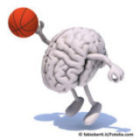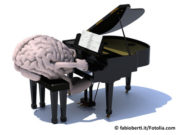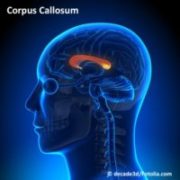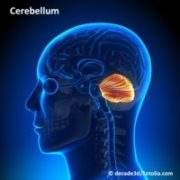Albert Einstein, at or near the top of anyone’s list of “greatest scientists of the twentieth century,” revolutionized science with his theory of relativity. And what did he have to say about this discovery?
 The theory of relativity occurred to me by intuition, and music is the driving force behind this intuition. My parents had me study the violin from the time I was six. My new discovery is the result of musical perception.*
The theory of relativity occurred to me by intuition, and music is the driving force behind this intuition. My parents had me study the violin from the time I was six. My new discovery is the result of musical perception.*
According to Einstein’s sister, Maja: “After playing piano, he would get up saying There, now I’ve got it. Something in the music would guide his thoughts in new and creative directions.”**
And he told one of the founders of Gestalt psychology, Max Wertheimer (who wrote Productive Thinking, one of the classics about the creative process), that he never thought in logical symbols or mathematical equations, but in images, feelings, and even musical architectures.***
It would be difficult to find a more eloquent advocate for the study of music than Einstein. But all children are not going to be Einsteins, so why study music?
I’ve written in the past about the hype that surfaced in the press twenty years ago that “Listening to Mozart makes you smarter“, or as it came to be called, “the Mozart Effect.” This was a press response to a small study that showed that listening to Mozart improved performance on a specific spatial-temporal reasoning task – for a very short period of time. The authors of the study did not say that listening to Mozart increased intelligence, but the press got wind of the study and apparently decided the idea that listening to music could make you smarter would make good copy. The headlines caught people’s attention, and the concept remains embedded in the public consciousness today.
Since that study twenty years ago, there have been hundreds of research studies that have looked at the effect that studying music has on cognitive development, and while there is no evidence whatsoever that listening to music makes you smarter, there is a great deal of evidence that learning to play a musical instrument gives you a lifelong cognitive edge in many other areas. Many neuroscientists consider making music to be the most complex cognitive activity that a human engages in, and they believe that it does, in fact, have an impact on other kinds of learning.
As a musician who has spent a lifetime in music, I believe passionately that music should be studied for its own intrinsic value – for its artistic and aesthetic merits, for what it tells us about history and culture, for its ability to express emotion through sound. But as someone who also studies neuroscience, it’s difficult to ignore the research that demonstrates the lifelong cognitive advantages of studying music.
And sometimes, the fact that studying music has an impact academically in other areas is an argument that sways local, state and national politicians, many of whom see the arts as an easy target when budgets are tight (as we are currently witnessing). Many of the scientists who do research in the cognitive benefits of studying music argue enthusiastically for the inclusion of music in the K-12 curriculum because they see first-hand what learning an instrument can do for a child – or an adult. So what does studying an instrument do for your brain?
Although the anatomy of everyone’s brain is basically the same, each individual’s brain develops in a particular way based on that person’s learning and experience. For
example, the brain areas involved in acquiring, practicing, and maintaining the skills of an athlete are different from those involved in acquiring, practicing, and maintaining the skills of a  musician or a simultaneous translator or a neurosurgeon. So the brain of an athlete will look a little different from that of a musician. This ability of the brain to change or reorganize itself in response to experience or learning is called neuroplasticity.
musician or a simultaneous translator or a neurosurgeon. So the brain of an athlete will look a little different from that of a musician. This ability of the brain to change or reorganize itself in response to experience or learning is called neuroplasticity.
Neuroscientists consider musicians to be excellent models of neuroplasticity for a couple of reasons: 1) The demands placed on the nervous system when studying and making music are complex and unique because it is a motor activity as well as a multisensory activity so many areas of the brain are involved. 2) Learning to play a musical instrument, acquiring skills, and maintaining those skills involves years of practice, so changes in the brain can be tracked over a period of time.
What areas of the brain are you using when you make music? Visual processing areas. If you are playing from a score, you are processing visual symbols, symbols that are essentially a second language. If you are improvising, you aren’t looking at a score, but you are no doubt looking at a keyboard; strings, keys or a fingerboard on your instrument; your drums, etc.
Auditory, motor and somatosensory processing areas. You hear the sound of those visual symbols in your mind, translate them into motor commands, and execute those commands on your instrument or with your voice, listening at the same time to ensure that the sounds you are making actually correspond with the symbols you see on the page or with the sounds you want to create. And you are using your kinesthetic sense – feeling the keys or strings as you play, or feeling your mouth against a reed or mouthpiece
Most instruments require two hands, each doing something different, so bimanual
coordination is important (motor areas again). The brain areas that process emotion, access long-term memory, and give us information about visual-spatial perception and function are involved. The areas of the brain that control executive  function are important because you are using working memory, attention, reasoning, planning, and problem solving.
function are important because you are using working memory, attention, reasoning, planning, and problem solving.
If you are playing in an ensemble, you are paying attention to coordinating your timing and pitch with your colleagues, as well as in creating a shared interpretation. Who knew that we used so much brain real estate? Robert Zatorre, cognitive neuroscientist and professor of neuroscience at the Montreal Neurological Institute, has written: “Indeed, from a psychologist’s point of view, listening to and producing music involves a tantalizing mix of practically every human cognitive function.”
And when you practice an instrument over a period of months or years, changes occur in many of these brain areas that are involved in making music. For example, the areas in the motor cortex representing the fingers of both hands in pianists are larger because pianists use all 10 fingers extensively. On the other hand (no pun intended), only the left hand area is larger in violinists because that is the fingering hand. Embouchure areas are larger in brass and wind players.
The corpus callosum, the band of fibers connecting the right and left hemispheres is larger in musicians who began study before the age of 7 because so much information is transmitted between the two hemispheres when making music. And the cerebellum, which is important for motor skill programming and learning, is larger in male musicians. Females already have a  larger cerebellum so the researchers cited a ceiling effect to explain the fact that it didn’t increase in size in females.
larger cerebellum so the researchers cited a ceiling effect to explain the fact that it didn’t increase in size in females.
So learning to play a musical instrument causes many plastic changes in the brain. Before you wonder whether some people may have been born with certain areas that are larger in the brain so are predisposed for making music, the answer is no. When researchers have looked at the brains of children prior to, and following instrumental study, they can see clearly that the changes occur as a result of practice.
The more one has practiced, the more the brain changes will be evident. For example, a study of Swedish pianists showed increased white matter volume (nerve fibers) corresponding with the number of years the pianists had been playing. So as we practice, we are building more and stronger neural connections in the brain areas involved with making music and this results in structural changes in the brain. The skills we develop as we practice, whether for a better technique, more finely tuned auditory discrimination, or more accurate pitch discrimination result in some areas of the brain being larger than in the general population. And conversely, it is those changes in the brain that make us better musicians.
It isn’t so surprising that motor, auditory, and somatosensory areas would change as one studies a musical instrument because music making involves sound and movement. But what interests many researchers are the brain changes that happen in areas that are further afield.
Scientists in labs all over the world have linked studying a musical instrument with better skills in language, math, speech perception and processing, memory, emotional control, executive function, and more. So over the next few blog posts, I’m going to write about some of this exciting research and what it means – whether for children, teens – or even adults who may have studied music several decades in the past and no longer actively make music – but continue to reap the benefits of earlier study.
*************
*A. Einstein speaking to Shinichi Suzuki, musical historian and instructor, cited in Shinichi Suzuki, 1969, Nurtured by Love: A New Approach to Education, p.90.
**Einstein’s sister Maja, cited in Jamie Sayen, 1985, Einstein in America, p26.
***Max Wertheimer, 1959, Productive Thinking. New York: Harper and Brothers.
2 responses to “Why study music, part I”
Good to read an intelligent, neuroscience-based discussion on the effects and benefits of studying music. Looking forward to the next one in the series.
Thanks, Sandy. The next post won’t happen immediately but soon, I hope.